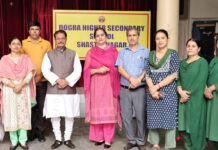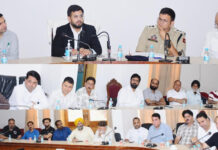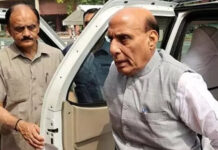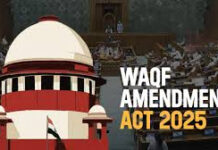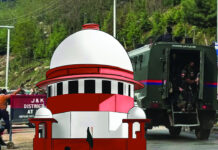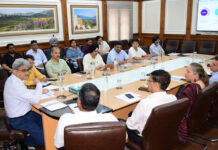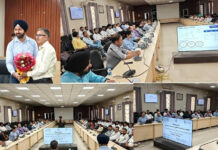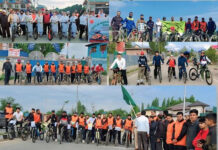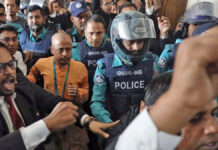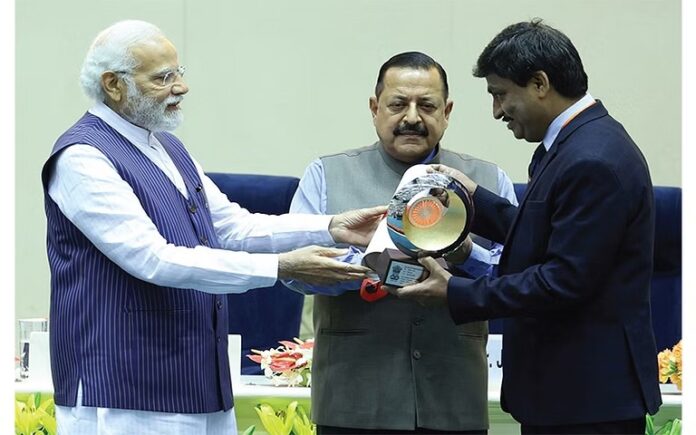New Delhi, Apr 21: Prime Minister Narendra Modi Friday said that the country was moving forward to achieve the goals of developed India.
An official spokesman in a statement issued on Press Information Bureau (PIB) here said that addressing the civil servants on the occasion of 16th Civil Services Day, 2023, at Vigyan Bhawan in New Delhi, the PM congratulated everyone on the occasion of Civil Services Day.
He said that the occasion of Civil Services Day this year becomes much more special as the country has completed 75 years of its independence and was starting to move forward to achieve the goals and objectives of a developed India.
The PM also conferred the Prime Minister’s Awards for Excellence in Public Administration and released the e-books ‘Viksit Bharat – Empowering Citizens and Reaching the last mile Volume I and II.
He highlighted the contributions of those civil servants who joined the service 15 to 25 years ago and emphasised the role of young officers who would contribute towards nation building in the next 25 years of ‘Amrit Kaal’.
The PM expressed confidence that the young officers were extremely fortunate to serve the nation in this ‘Amrit Kaal’.
“The responsibility to accomplish the dreams of every freedom fighter of the nation lies upon every shoulder,” he said, pointing out the paucity of time but the abundance of potential and courage in the country.
The PM said that the country was prepared for a take off due to the work done in the last 9 years.
He said that different results were being obtained with the same bureaucracy and personnel.
The PM acknowledged the role of ‘Karamyogis’ in the growing profile of the country on the global stage, for the growing confidence of the poorest of the poor in ‘Sushasan’ and for a new momentum of development of the country.
He said India was rising as the 5th largest economy in the world, taking strides in fintech as India was number one in digital transactions, was one of the cheapest mobile data countries, and the third largest startup ecosystem in the world.
The PM said that transformative changes were taking place in the rural economy, railways, highways, port capacity augmentation, and the number of airports.
He said that the awards today reflect the contribution and sense of service of the ‘Karmyogis’.
Recalling his address from the ramparts of the Red Fort on August 15 last year when the PM invoked the ‘Paanch Pran’ – the development of Viksit Bharat or developed India, breaking the slavery mentality, taking pride in India’s heritage, strengthening the unity and diversity of the country, and keeping one’s duties before anything else – he underlined that the energy emanating from these five resolves would take the nation to its deserved place in the world.
Dwelling on the theme of this year’s Civil Service Day being based on the notion of ‘Viksit Bharat’, the PM said that the concept of ‘Viksit Bharat’ was not limited to modern infrastructure.
“It is important for Viksit Bharat that India’s government system supports the aspirations of every Indian and every government servant helps every citizen in realising their dreams and the negativity that was associated with the system in the previous years, turns into positivity,” he said.
Throwing light on decades of experience after India’s independence, the PM talked about the importance of last-mile delivery in the implementation of government schemes.
He gave examples of results from policies of previous governments and mentioned that there were more than 4 crore fake gas connections, more than 4 crore fake ration cards, and support was provided to 1 crore fictitious women and children by the Ministry of Women and Child Development, fake scholarships were offered to approximately 30 lakh youth by the Ministry of Minority Welfare, and lakhs of fake accounts were created under MGNREGA to transfer the benefits of workers who never existed.
The PM highlighted that a corrupt ecosystem had emerged in the country under the pretext of these fake beneficiaries.
He credited the civil servants for the transformation that has taken place in the system where roughly Rs 3 lakh crore had been saved from landing in the wrong hands, which was now being used for the welfare of the poor.
The PM emphasised that when time is limited, it becomes very critical to decide the direction and working style.
“Today’s challenge is not about efficiency but in figuring out how to find and remove deficiencies,” he said.
The PM recalled the time when in the garb of deficiency even the small aspect was attempted to be controlled.
He said today the same deficiency was being turned into efficiency, removing obstacles in the system.
“Earlier, the thinking was that the government will do everything, now the thinking is that the government will work for everyone,” the PM said, highlighting the efficient use of time and resources to serve everyone. “Motto of the government is ‘Nation First-Citizen First’, today’s government’s priority is prioritizing the deprived.”
He said that the government was going up to Aspirational Districts and up to Aspirational Blocks.
The PM said today’s government was treating border villages as the first villages rather than the last villages.
He said that for 100 percent saturation, there was a need for even more hard work and innovative solutions.
The PM gave the example of departments asking for NoCs and information that was available somewhere in the system.
He said for ease of living and ease of doing business, there was a need to find solutions.
Giving an example of the PM Gatishakti Master Plan, the PM explained that all data layers related to any infrastructure project could be found on a single platform and stressed the need to utilise it to the maximum for better planning and execution in the social sector.
He said that it would greatly benefit in identifying the needs of citizens, tackling issues related to education that might arise in the future, and enhancing communication between departments, districts and blocks while also helping in the formulation of future strategies.
The PM stressed that the ‘Amrit Kaal’ had brought immense challenges along with great opportunities.
He said that today’s aspirational citizens were not willing to wait for long to see changes in the systems and this needed full efforts.
“Taking quick decisions and implementing them with speed has become all the more important as the expectations of the world from India have also risen dramatically,” the PM said. “As the world is saying that India’s time has arrived, there is no time to be wasted by the bureaucracy of the country. The country has put its faith in you, work while maintaining that trust. Basis of all your decisions should always be in the national interest.”
Highlighting the importance and necessity of political parties with different ideologies in a democracy, he stressed the need for bureaucracy to assess whether the political party in power was utilising the taxpayers’ money for the benefit of the nation.
“It is the duty of the bureaucracy to analyse whether a political party was making use of taxpayers’ money for the benefit of their own organisation or the nation’s,” the PM said. “If it is using the money to create a vote bank or making the lives of the citizens easier; if it is advertising itself with the government treasure or making the people aware; if it is appointing its own party workers in various organisations or creating a transparent process for recruitment.”



